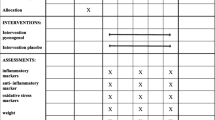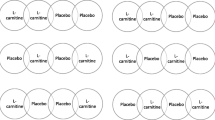Abstract
Background
Curcuminoids are dietary polyphenols that can improve health indices through different mechanisms such as anti-inflammatory, antioxidant and immunoregulatory properties. Due to the lack of evidences on the efficacy of curcuminoids in critically ill patients, this study was designed to investigate the effects of short-term curcuminoids supplementation on inflammatory, oxidative stress and adipokine indices as well as nutritional and clinical status in Traumatic Brain Injury (TBI) patients admitted in the Intensive Care Unit (ICU).
Methods
The present trial will be performed in the ICU of Sina and Shohadaye Tajrish hospitals of Tehran, Iran. Sixty-two critically ill patients with TBI will be enrolled based on the eligibility criteria. The patients will be randomly assigned into two groups. For 7 days, they will received either 500 mg curcuminoids in combination with 5 mg piperine or matched placebo. A general questionnaire, consent form as well as NUTRIC, SOFA and APACHEII scoring system and anthropometrics will be assessed at baseline. The inflammatory markers including TNF-α, IL-6, MCP-1 and CRP, oxidative stress indices (GPx and SOD) and adipokines (leptin and adiponetctin) will be measured at baseline and at the end of the study. In addition, dietary intake, concomitant drugs and laboratory tests will be recorded daily.
Discussion
To the best of our knowledge, this is the first clinical trial investigating the effect of curcuminoids supplementation in critically ill patient with TBI. The findings of the present study will provide evidence on the efficacy and safety of curcuminoids in these patients.
Trial registration number
(http://www.irct.ir, identifier: IRCT20180619040151N1), Registration date:18.09.2018.

Similar content being viewed by others
Abbreviations
- TBI:
-
Traumatic brain injury
- ICU:
-
Intensive care unit
- TNF-α:
-
Necrosis factor-α
- IL-6:
-
Interleukine-6
- MCP-1:
-
Monocyte chemoattractant protein-1
- CRP:
-
C-reactive protein
- APACHEII:
-
Acute physiology and chronic health evaluation II
- SOFA:
-
Sequential organ failure assessment
- NUTRIC:
-
Nutrition risk in the criticallay ill
- SDH:
-
Acute subdural hematoma
- ICH:
-
Intracranial hemorrhage
- DAI:
-
Diffuse axonal injury
- NF- kB:
-
Nuclear factor-kappa B
- Nrf2:
-
Nuclear factor erythroid 2-related factor 2
- GPx:
-
Gluthation peroxidase
- SOD:
-
Superoxide dismutase
- GCS:
-
Glascow coma score
- BMI:
-
Body mass index
- GRAS:
-
Generally recognized as safe
- FDA:
-
Food and Drug Adminstration
- ELISA:
-
Enzymed-linked immunosorbent Assay
- ANOVA:
-
Analysis of variance (ANOVA).
References
Plesnila N. The immune system in traumatic brain injury. Curr Opin Pharmacol. 2016;26:110–7.
Young LA, Rule GT, Bocchieri RT, Burns JM. Biophysical mechanisms of traumatic brain injuries. Semin Neurol. 2015;35(1):5–11.
Lozano D, Gonzales-Portillo GS, Acosta S, de la Pena I, Tajiri N, Kaneko Y, et al. Neuroinflammatory responses to traumatic brain injury: etiology, clinical consequences, and therapeutic opportunities. Neuropsychiatr Dis Treat. 2015;11:97–106.
Maas AI, Stocchetti N, Bullock R. Moderate and severe traumatic brain injury in adults. Lancet Neurol. 2008;7(8):728–41.
Finfer SR, Cohen J. Severe traumatic brain injury. Resuscitation. 2001;48(1):77–90.
Polinder S, Meerding WJ, Mulder S, Petridou E, van Beeck E. Assessing the burden of injury in six European countries. Bull World Health Organ. 2007;85(1):27–34.
Fakharian E, Mohammadzadeh M, Behdadmehr S, Sabri HR, Mirzadeh AS, Mohammadzadeh J. Repetitive traumatic brain injury in patients from Kashan. Iran Trauma Monthly. 2016;21(4):e23869.
Saatman KE, Duhaime AC, Bullock R, Maas AI, Valadka A, Manley GT. Classification of traumatic brain injury for targeted therapies. J Neurotrauma. 2008;25(7):719–38.
Raj R, Skrifvars M, Bendel S, Selander T, Kivisaari R, Siironen J, et al. Predicting six-month mortality of patients with traumatic brain injury: usefulness of common intensive care severity scores. Crit Care (London, England). 2014;18(2):R60.
Heyland DK, Dhaliwal R, Jiang X, Day AG. Identifying critically ill patients who benefit the most from nutrition therapy: the development and initial validation of a novel risk assessment tool. Critical care (London, England). 2011;15(6):R268.
Deguchi A. Curcumin targets in inflammation and cancer. Endocrine, Metab Immune Disord Drug Targets. 2015;15(2):88–96.
Panahi Y, Hosseini MS, Khalili N, Naimi E, Majeed M, Sahebkar A. Antioxidant and anti-inflammatory effects of curcuminoid-piperine combination in subjects with metabolic syndrome: A randomized controlled trial and an updated meta-analysis. Clin Nutrit (Edinburgh, Scotland). 2015;34(6):1101–8.
Panahi Y, Alishiri GH, Parvin S, Sahebkar A. Mitigation of systemic oxidative stress by Curcuminoids in osteoarthritis: results of a randomized controlled trial. J Diet Supplements. 2016;13(2):209–20.
Liu X, Machado GC, Eyles JP, Ravi V, Hunter DJ. Dietary supplements for treating osteoarthritis: a systematic review and meta-analysis. Br J Sports Med. 2018;52(3):167–75.
Sahebkar A. Curcuminoids for the management of hypertriglyceridaemia. Nat Rev Cardiol. 2014;11(2):123.
Rahmani S, Asgary S, Askari G, Keshvari M, Hatamipour M, Feizi A, et al. Treatment of non-alcoholic fatty liver disease with Curcumin: a randomized placebo-controlled trial. Phytotherapy research : PTR. 2016;30(9):1540–8.
Gupta SC, Kismali G, Aggarwal BB. Curcumin, a component of turmeric: from farm to pharmacy. BioFactors (Oxford, England). 2013;39(1):2–13.
Corps KN, Roth TL, McGavern DB. Inflammation and neuroprotection in traumatic brain injury. JAMA Neurol. 2015;72(3):355–62.
Calabrese V, Bates TE, Mancuso C, Cornelius C, Ventimiglia B, Cambria MT, et al. Curcumin and the cellular stress response in free radical-related diseases. Mol Nutr Food Res. 2008;52(9):1062–73.
Aggarwal BB, Gupta SC, Sung B. Curcumin: an orally bioavailable blocker of TNF and other pro-inflammatory biomarkers. Br J Pharmacol. 2013;169(8):1672–92.
Motterlini R, Foresti R, Bassi R, Green CJ. Curcumin, an antioxidant and anti-inflammatory agent, induces heme oxygenase-1 and protects endothelial cells against oxidative stress. Free Radic Biol Med. 2000;28(8):1303–12.
Panahi Y, Hosseini MS, Khalili N, Naimi E, Soflaei SS, Majeed M, et al. Effects of supplementation with curcumin on serum adipokine concentrations: A randomized controlled trial. Nutrition (Burbank, Los Angeles County, Calif). 2016;32(10):1116–22.
Rahimnia AR, Panahi Y, Alishiri G, Sharafi M, Sahebkar A. Impact of supplementation with Curcuminoids on systemic inflammation in patients with knee osteoarthritis: findings from a randomized double-blind placebo-controlled trial. Drug Res. 2015;65(10):521–5.
Basnet P, Skalko-Basnet N. Curcumin: an anti-inflammatory molecule from a curry spice on the path to cancer treatment. Molecules (Basel, Switzerland). 2011;16(6):4567–98.
Goel A, Jhurani S, Aggarwal BB. Multi-targeted therapy by curcumin: how spicy is it? Mol Nutr Food Res. 2008;52(9):1010–30.
Acknowledgements
The support of Tehran University of Medical Sciences and Semnan University of Medical Sciences and Health Services and cooperation of the Sina and Shohadaye Tajrish hospitals as well as patient advisers are acknowledged.
Funding
The present research has been supported by Tehran University of Medical Sciences and Semnan University of Medical sciences and Health Services grant no. 96–04–161-37823.
Author information
Authors and Affiliations
Contributions
Ablodreza Norouzy cooperated on the initial study concept and design of this research, which was further developed by Mahdi Shadnoush and Mohammad-Javad Hosseinzadeh-Attar. Saeed Hoseeini revised the study. Mostafa Qorbani advised on statistical analysis and interpretation of data. Atabak Najafi, Arezoo Ahmadi and Seyed-Hoseein Ardehali coordinated participant management and data collection and relevant questionnairs. Hoda Zahedi and Amirhossein Sahebkar took part in drafting the manuscript and technical or material support. Hamideh Moravvej and Gholamreza Pourmand will corporate in laboratory activities. The manuscript has been read and approved by all authors.
Corresponding authors
Ethics declarations
Ethics approval and consent to participate
The Ethics Committee of Tehran University of Medical Sciences (IR.TUMS.VCR.REC.1397.141) and Semnan University of Medical Sciences and Health Services (IR.SEMUMS.REC.1397.001) has approved the protocol of this study. A written informed consent form will be signed and dated by subjects or their legal guardians and investigators at the beginning of the study.
Conflict of interests
The authors declared that they have no competing interests.
Additional information
Publisher’s note
Springer Nature remains neutral with regard to jurisdictional claims in published maps and institutional affiliations.
Rights and permissions
About this article
Cite this article
Zahedi, H., Hosseinzadeh-Attar, MJ., Sahebkar, A. et al. Therapeutic effects of supplementation with Curcuminoids in critically ill patients receiving enteral nutrition: a randomized controlled trial protocol. J Diabetes Metab Disord 19, 1609–1614 (2020). https://doi.org/10.1007/s40200-019-00451-w
Received:
Accepted:
Published:
Issue Date:
DOI: https://doi.org/10.1007/s40200-019-00451-w




